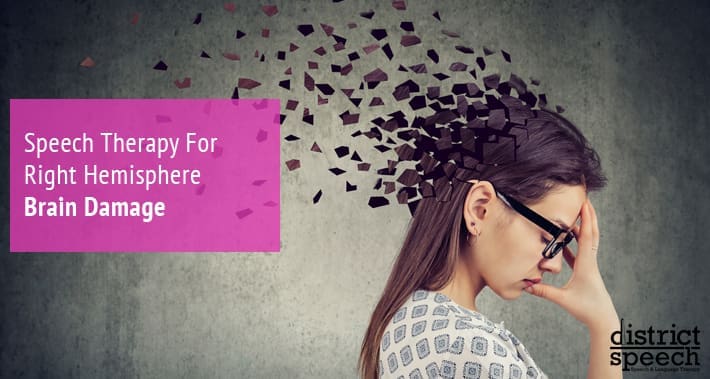
No matter the cause, brain damage is a serious medical condition that can cause debilitating symptoms.
If you or a loved one has suffered from brain damage, you know how drastically the symptoms can interfere with daily life.
Speech therapy for brain injury can help manage and provide solutions for these symptoms.
In this article, we will learn about right hemisphere brain damage, its symptoms and causes, as well as how speech therapy can help.
What Is The Right Hemisphere?
Your brain is divided into two parts, which we call hemispheres, which control different aspects of your body.
The right hemisphere is the part of the brain that is responsible for your communication skills and pragmatics, including eye movement and facial expressions.
Damage to this part of the brain commonly causes severe communication and language difficulties.
Right hemisphere brain damage can affect language and communication skills in the following ways:
- Difficulty assigning meanings to words, or relate words with similar meanings (semantic processing of words)
- Difficulty with comprehending language (discourse processing)
- Difficulty using rhythm and intonation (prosody)
- Difficulty understanding relationships between words, people, and contexts (pragmatics)
Symptoms Of Right Hemisphere Brain Damage
Right hemisphere brain damage can cause a variety of symptoms that can range in severity, depending on the site and extent of your brain injury.
Symptoms of right hemisphere brain damage can include impairments surrounding language, cognitive processing, and emotional regulation.
Symptoms of right hemisphere brain damage on language include:
- Impaired executive function, including losing track of thoughts and actions, and impaired logical thinking
- Impaired attention
- Unilateral neglect, or the inability to see objects towards your left side
- Impaired judgment and reasoning
- Difficulty with problem solving
- Impaired awareness
- Impaired memory
Symptoms of right hemisphere brain damage on cognitive processing include:
- Impaired executive function, including losing track of thoughts and actions, and impaired logical thinking
- Impaired attention
- Unilateral neglect, or the inability to see objects towards your left side
- Impaired judgment and reasoning
- Difficulty with problem solving
- Impaired awareness
- Impaired memory
Symptoms of right hemisphere brain damage on emotional regulation include:
- Emotional disorders, such as emotional ability
- Difficulty interpreting or conveying information
- Reduced empathy
Other deficits caused by right hemisphere brain damage include:
- Difficulty controlling muscles to speak (dysarthria)
- Difficulty swallowing (dysphagia)
- Paralysis in lower face, arm, and leg on one side of the body (hemiplegia)
It’s worth noting that these symptoms overlap with a number of other health concerns, including autism spectrum disorder and dementia, so if you or a loved one are experiencing any of the above, it’s a good idea to see a speech therapist to have them screen you.
What Causes Right Hemisphere Brain Damage?
Right hemisphere brain damage is an acquired injury, meaning it occurs after some sort of trauma.
Examples of such trauma include:
- Stroke
- Brain tumors
- Brain surgery
- Brain infections
- Accidents
- Seizure disorders
- Traumatic brain injury (TBI)
Screening For Right Hemisphere Brain Damage
If you suspect that you or a loved one are suffering from right hemisphere brain damage, a Washington DC speech therapist can conduct a screening to identify areas for further assessment.
Your speech therapist may use a combination of standardized and non standardized screening methods to assess your oral motor functions, speech production skills, language comprehension and production, pragmatic language skills, attention, memory, and executive function.
Screening may result in:
- Recommendations for a comprehensive assessment; or
- Referral for other examinations, such as psychiatric, hearing, or vision testing
Should you require a comprehensive assessment, your speech therapist will assess the following:
- Impairments in your body structure and function
- Comorbid deficits that may explain your symptoms, such as medications or an underlying neurological condition
- Your limitations in social activities and participation
- Contextual factors, such as environmental factors, that serve as barriers to successful communication;
- The impact of your impairments on your quality of life
During a comprehensive assessment, your speech therapist will use a variety of examination methods, including case history, self reports, oral and language assessments, feeding and swallowing assessments, and hearing assessments.

How A Speech Therapist Can Help With Brain Damage
Speech therapy is an excellent method of treatment for right hemisphere brain damage.
The type of treatment you will receive will depend on which areas you are experiencing difficulties, as well as your personal goals.
Treatment can be restorative or compensatory.
1. To Improve Language
Treatment for language deficits caused by right hemisphere brain damage focus on improving narrative and conversational discourse, understanding and managing alternate meanings, and pragmatics.
Treatments for the improvement of narrative and conversational skills focus on improving your ability to identify the “big picture” in stories, as well as improving your ability to understand relationship between different words or items.
Treatments for the improvement of understanding and managing alternate meanings focus on improving your ability to understand nonliteral language and assign multiple meanings to words.
Treatments for the improvement of pragmatics utilize techniques, such as role play and video modeling, to improve your social communication.
2. To Improve Executive Function
Executive function refers to cognitive skills, such as problem solving, thinking flexibly, setting and completing goals and staying on track.
Treatment for executive function deficits due to right hemisphere brain damage include metacognitive and compensatory strategies, and environmental modifications.
Metacognitive and compensatory strategies encourage the use of systems, such as brainstorming for problem solving and creating a timeline to complete goals, to improve your executive function.
Environmental modifications utilize strategies, such as labelling drawers and cabinets, to improve executive function.
3. To Improve Attention
Treatment for attention deficits due to right hemisphere brain damage include direct approaches, metacognitive and compensatory strategies, and environmental modifications.
Direct approaches to the improvement of attention include computerized attention tasks that require you to monitor a computer screen and cancellation tasks that require you to select a specific target.
Metacognitive and compensatory strategies use tools, such as graphs or charts, to help you stay focused on the steps needed to achieve a specific goal.
Environmental modifications focus on changing your environment to minimize distraction, including the removal of distracting objects.
4. To Improve Memory
Treatments for memory deficits due to right hemisphere brain damage focus on the use of external reminders and internal strategies.
External reminders for the improvement of memory include the use of tools such, as to do lists and calendars.
Internal strategies for the improvement of memory focus on tools, such as visualization, rehearsal, and repetition of information.
5. To Address Unilateral Neglect
Treatments for unilateral neglect due to right hemisphere brain damage typical focus on left visual neglect as it affects language and communication.
Strategies to improve unilateral neglect include completing tasks that require scanning an entire room, as well as using virtual reality computer programs in order to encourage three dimensional navigation of an environment.
Book Your Appointment With District Speech Today
If you or a loved one is struggling with the symptoms associated with right hemisphere brain damage, you are not alone.
At District Speech, our qualified speech therapists can help you manage and improve your symptoms.
Contact us to book an appointment.
1300 I St NW, Suite 400 E,
Washington, DC 20005
- https://g.page/districtspeech
District Speech and Language Therapy specializes in speech therapy, physical therapy, and occupational therapy solutions, for both children and adults, in the Washington D.C and the Arlington Virginia areas.